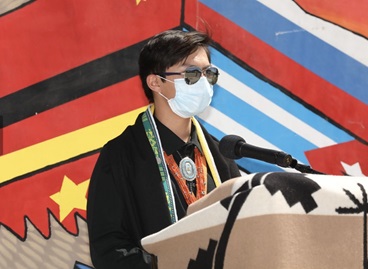Finding Opportunity as an Indigenous Student
By Sky Harper
November 16, 2022

Guest blogger Sky Harper, a third-year chemistry major, shares his experience as an Indigenous student at Drexel.
This article originally appeared on the Drexel Undergraduate Admissions blog.
Ya'at'eeh, shi ei Sky Harper yinishye. Kinyaa'aanii nishli, tachiinii baashishchiin, tohtsoni da shi cheii doo kinyaa'aanii dashi nali. My name is Sky Harper, and I am of the towering house clan, born for the red running into water. My maternal grandfather is of the big water clan and my paternal grandfather is of the towering house clan.
From birth, I was surrounded by my culture; the language, teachings and stories. I learned our place on the earth and our relationship with nature and each other. As I grew up, I was drilled with the mission to achieve an education and use it to better my community and my people. However, on the journey, I often find myself the only Indigenous person in the room, pioneering a path few of our people have taken.
Coming to Drexel was a challenge. I found myself at an institution where there was not the strongest Indigenous presence. I didn't blame the institution, but rather the history of Native Americans in the East. Drexel University welcomed me and, in many ways, has since done its best to establish a network of support as well as an atmosphere of inclusivity. Most notably, the College of Arts and Sciences, the Pennoni Honors College, and the LSAMP program have all been direct conduits of opportunity and development.
The summer between my first and second years, I took part in the STAR Scholars summer research program offered by the Undergraduate Research & Enrichment Programs office and conducted research on polymerization in the chemistry department with Dr. Ji. From this research experience, I was fortunate to be able to present at several conferences, including the 2022 AAAS meeting and the 2022 Fall ACS meeting, and look forward to presenting at the upcoming 2022 AISES National Conference and 2022 SACNAS National Conferences.
Along with this term-long full-time research, I have also been able to take part in the Vertically Integrated Projects program and work in the CogNEW lab, as well as continue to work part-time with the USDA-ARS. These experiences, along with other programs and support Drexel offers, have allowed me to build a competitive résumé and develop many professional skills, well before my first co-op. I was able to leverage these experiences and apply for two nationally competitive fellowships, the Barry Goldwater fellowship and the Udall fellowship, both of which I was fortunate to receive.
Along with the research, I have also been doing work to bring awareness to the Indigenous presence on campus, as well as Indigenous issues. I have founded Drexel Indigenous Students of the Americas, and we have been building momentum to bring more attention to Indigenous students on campus.
Being away from home, over 1000 miles, for 75 percent of the year may seem daunting to some people, and I admit it did seem disheartening at first, but I have found my Drexel University family and support system. If you have ambition and motivation, there is an endless number of opportunities here.